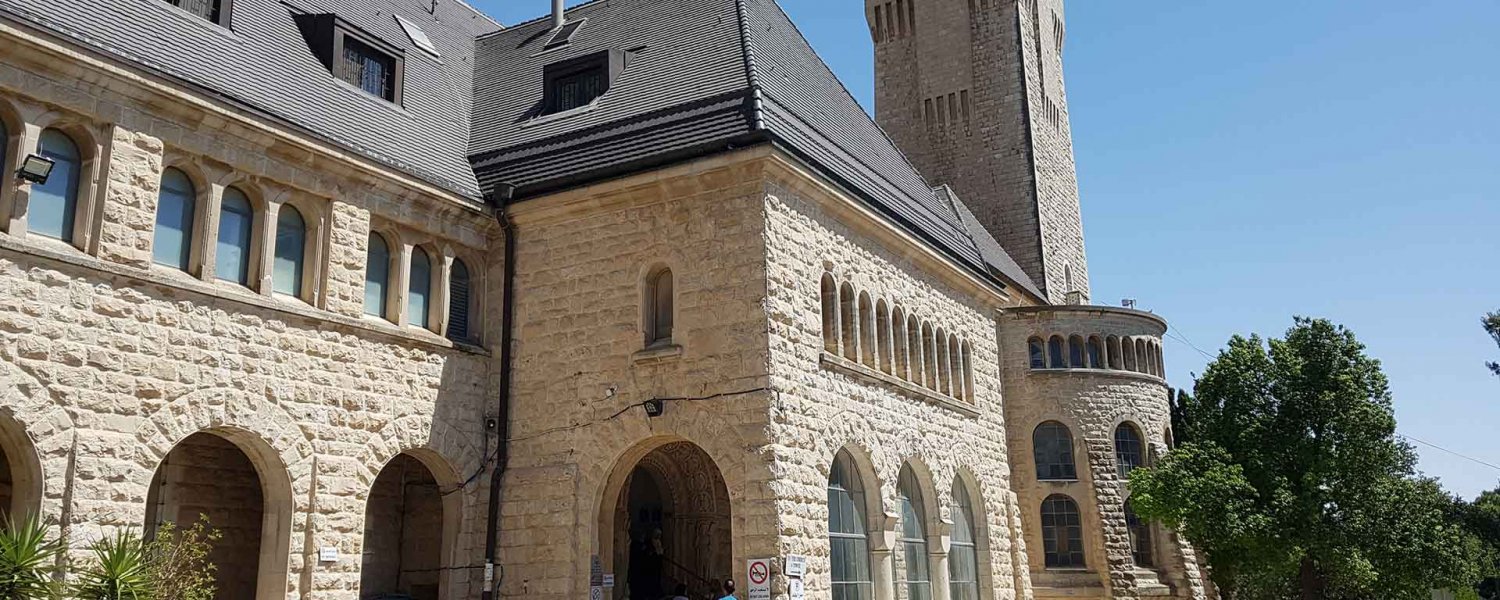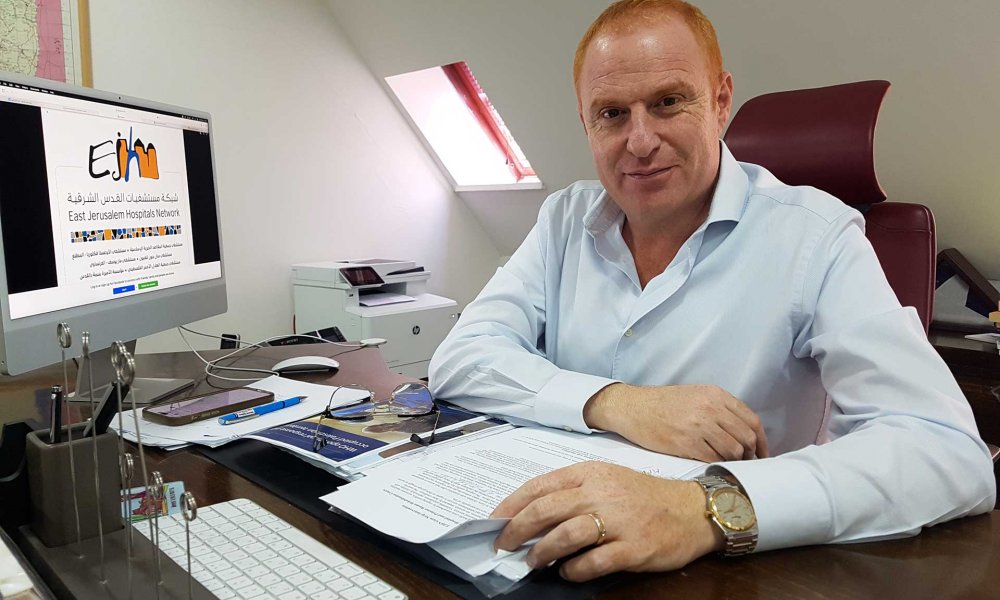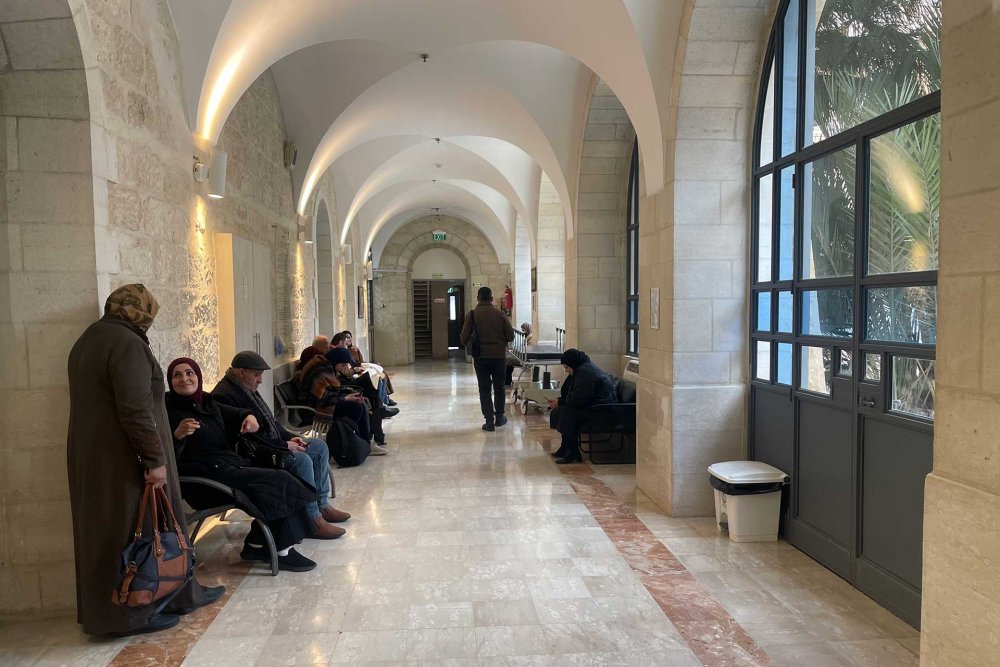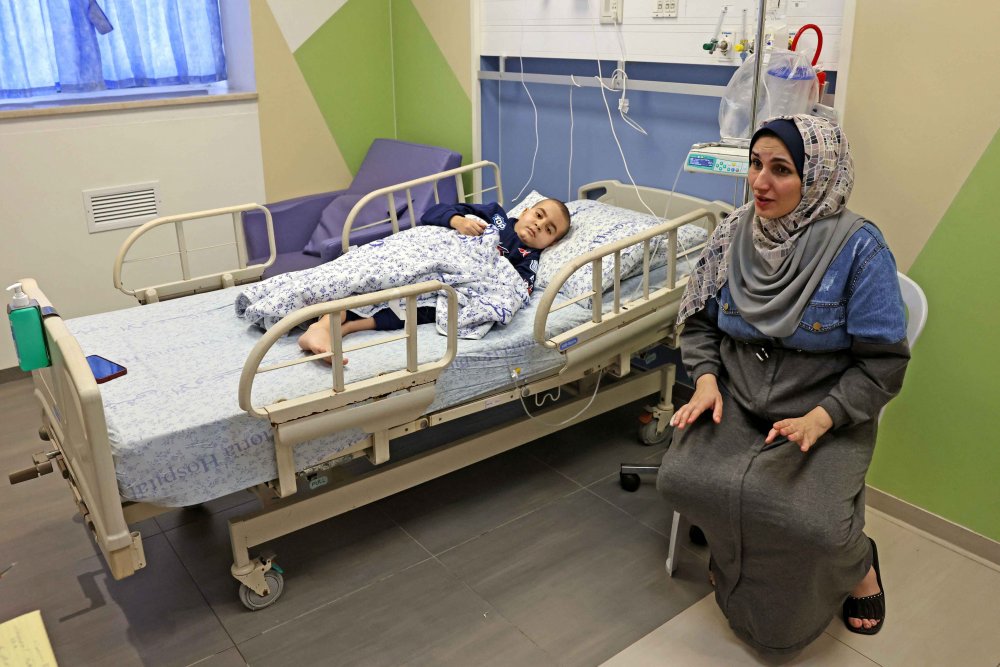Introduction

Credit:
Aseel Jundi for Jerusalem Story
East Jerusalem Hospitals Network: Resilient Palestinian Institutions Troubled by Economic Crisis and Silent War
Snapshot
Israel’s assault on Gaza and the obliteration of its health care infrastructure coupled with ongoing financial crises have increasingly burdened East Jerusalem’s Palestinian hospitals. Dr. Fadi al-Atrash explains how Palestinian hospitals in East Jerusalem are coping to continue serving patients from across the country.
Palestinian hospitals in Jerusalem, such as St. John Eye Hospital, have existed for decades, and in some cases more than 140 years. Before Israel severed East Jerusalem from the rest of the West Bank through closure, the Separation Wall, and the permit regime, East Jerusalem was the medical hub for the region. For Palestinian patients, many types of treatment and health care were and are only available in East Jerusalem. Despite Israeli restrictions and attempts to expand Israel’s presence in all sectors in Jerusalem, these health care institutions continue to uphold their Palestinian identity and serve their community.
Before October 7, 2024, for example, 40 percent of the patients needing cancer care at the Augusta Victorial Hospital came from Gaza, and the hospital was also able to send medical teams to the Gaza Strip to care for the wounded after medical strikes there. This time, in this war, everything has changed; access in both directions is nearly impossible.1
On June 25, 2024, Jerusalem Story sat down with Dr. Fadi al-Atrash, secretary of the East Jerusalem Hospitals Network (EJHN) and CEO of Jerusalem’s Augusta Victoria Hospital, to discuss the mounting challenges that Palestinian hospitals in East Jerusalem face.
The interview has been edited for clarity and concision.
Jerusalem Story: When was the EJHN established, and what was its purpose?
Fadi al-Atrash: The network was founded in 1997 through the efforts of the late Jerusalemite leader Faisal al-Husseini. Its primary objective was to safeguard Palestinian institutions in Jerusalem at a time when laws were beginning to mandate the inclusion of Jerusalemites into the Israeli health care system without exception.
By uniting hospitals under a single umbrella, the network aimed to amplify their Palestinian voice and identity globally. It was conceived to defend these institutions and their identity in Jerusalem, striving to maintain their existence and resist assimilation into the Israeli health care system. This effort continues to preserve their distinct identity, which remains crucial to this day.
JS: What hospitals fall under the network’s umbrella?
FA: The network encompasses six hospitals which include:
- Makassed Charitable Society Hospital, the largest and first teaching hospital in Palestine with various departments, including pediatrics, internal medicine, cardiac surgery, orthopedics, and neurology
- Augusta Victoria Hospital (al-Mutlaa), which is currently the sole comprehensive cancer treatment center in Palestine. It also treats pediatric kidney diseases, performs bone marrow transplants, and manages blood disorders.
- The Palestinian Red Crescent Society Hospital, which is dedicated to maternity and gynecological diseases
- St. Joseph’s (French) Hospital, a general hospital with several departments
- St. John Eye Hospital, the first and only specialized eye hospital in Palestine, which handles many of the most complex eye cases
- Princess Basma Center, which includes a school and hospital for the rehabilitation of children with special needs
JS: How did the establishment of the network contribute to unifying efforts and enhancing cooperation among these hospitals? Did you find strength in your union, and if so, how?
FA: In truth, uniting the hospitals under one network was an excellent and powerful idea to consolidate efforts, maintain a strong unified stance, and increase cooperation among the hospitals. The fact is that collaborations are challenging technically, since each hospital has a different specialization and governance system, as they are affiliated with different entities. For instance, Makassed Hospital is affiliated with an Islamic charitable association, while Augusta Victoria Hospital is associated with the Lutheran World Federation, and so on. However, there are ways to find avenues for cooperation, service integration, patient admission facilitation, and service development in each hospital.
JS: Israel seeks to bring you under the authority of the Israeli Ministry of Health. Tell us about these efforts and whether this ministry helps or restricts you?
FA: The Israeli Ministry of Health treats us as institutions within the boundaries of what they consider unified Jerusalem, disregarding the distinction between East and West Jerusalem. Consequently, they are attempting to impose their laws and intervene in our operations by various means.
Restrictions are placed on admitting medical staff to work in Jerusalem since most of our hospital staff come from various governorates of the West Bank, making it difficult to bring them in. This poses challenges that hinder hospital operations and the recruitment of expertise, as the ministry wants them to work under Israeli law, which involves several steps.
We operate from the premise that we must maintain our presence and thus, we deal with the Israeli Ministry of Health and try to adapt to some laws, while simultaneously striving to preserve our Palestinian identity. This is the biggest challenge.
JS: How many patients do you serve?
FA: All six hospitals provide quality services to the Palestinian people. Beyond service delivery, these hospitals have become a backbone of the Palestinian health care system through training, supplying expertise, proposing reforms, and more.
We treat tens of thousands of patients annually, with a minimum of 8,000 to 12,000 patients each year.
JS: From which geographical areas do the patients receiving treatment at these hospitals come from?
FA: Patients come from all regions: the West Bank, Gaza Strip, and Jerusalem. The percentage of patients from Gaza at Augusta Victoria Hospital and Makassed Hospital has ranged between 30 and 40 percent of the total patients.
Augusta Victoria and Makassed are the primary destinations for referrals outside the Gaza Strip, serving as specialized referral hospitals rather than providing primary or secondary health care.
JS: How has the gradual closure of East Jerusalem and the permit system, even before the recent war, affected the network’s ability to serve patients in need?
FA: Providing services to patients has become increasingly challenging over time, with the level of difficulty varying according to the security situation in the West Bank. This situation affects Palestinians’ ability to access Jerusalem. At times, entering the city is difficult, and at other times, it is nearly impossible, except for medical purposes, due to military checkpoints and the lack of entry permits to the capital.
This has impacted our ability to admit patients when we should. But as hospitals, we do our best to maintain patient flow creatively, such as by establishing clinics outside Jerusalem to examine and schedule patients. At Augusta Victoria Hospital, we have arranged transportation from the West Bank to Jerusalem and provided lodging for patients in nearby hotels to reduce the risks that come with travel to and from the city.
JS: How has the Gaza war affected the network’s hospitals, their services, and their ability to treat patients? Which patients have been most affected, and what are the main challenges caused by the war?
FA: Jerusalem hospitals have been greatly impacted since the outbreak of the war on October 7, 2024. Initially, we encountered significant challenges in entering Jerusalem, with travel posing risks to both patients and medical staff. The increased restrictions on our staff’s entry jeopardized our operational capacity during that time. Through concerted efforts on multiple fronts, we managed to overcome this crisis, but we still face difficulties in admitting enough patients.
The patients most affected by the war are those from Gaza, who previously made up 30 to 40 percent of our patients, with cancer patients and those needing specialized surgeries being the most impacted. We continue to press various parties to allow them to leave Gaza and reach us for treatment.
Jerusalem has also suffered from their absence, as these patients and their companions brought life to the city’s streets and neighborhoods, maintaining a constant connection between the West Bank, Gaza, and Jerusalem.
The war has also hindered our ability to continue developmental projects, with some slowing down and others halting entirely as funds were redirected to meet Gaza’s needs.
During the war, we started noticing an escalation in restrictions, not only from of the Israeli Ministry of Health but other public institutions and ministries as well. For example, we used to receive certain property tax (arnona) discounts for hospitals, which were canceled at the start of the war. They now want to impose this tax on mobile units outside the main hospital building, which we use as offices for our staff.
We are trying to overcome these challenges, but there is an unspoken plan to Judaize [East] Jerusalem, targeting all [Palestinian] institutions. This started years ago, with the closure of Orient House and the attacks on the Palestinian curriculum and schools that teach it, and now it is the turn of the Palestinian health care institutions operating in Jerusalem. It is a silent war to complete the Judaization of the city, and we are trying to alert the world that we are Palestinian institutions bearing the Palestinian identity in East Jerusalem, which international law considers the capital of Palestine.
JS: In addition to closures and war, what are the key challenges you face?
FA: The financial challenge is the most serious one we face. The financial crisis affecting the EJHN began due to the financial pressures on the Palestinian Authority (PA), which redirected patients from Gaza and the West Bank to our facilities. As a result, their ability to fulfill their obligations to us diminished, leading to accumulating debts and jeopardizing our operational capacity.
There is ongoing dialogue aimed at resolving the crisis with the help of donor countries and the PA. We had hoped for improvements before the war, but circumstances worsened significantly with its onset.
Debts have multiplied, making it harder to borrow from pharmaceutical suppliers to sustain treatments, thereby affecting our ability to provide full care to all patients and pay full salaries to staff.
JS: What is the total amount of outstanding debt owed by the PA to all hospitals?
FA: The outstanding debt owed by the PA to the six East Jerusalem hospitals range from $100 million to $110 million, with 80 to 85 perecent of these debts owed to Augusta Victoria Hospital and Makassed hospital.
JS: Are the hospitals concerned about the deteriorating security situation in the country that could erupt at any moment? What are your plans to deal with it?
FA: Certainly, this concerns us greatly on several levels, starting with the difficulty of patient access, which poses risks to their lives. Our operational capacity is also affected by the scarcity of patient arrivals and the staff’s inability to reach the hospitals.
We have an emergency plan that can be activated at any moment, ensuring medical teams remain present in hospitals for extended periods during crises. It involves rotating staff, securing transportation, protecting personnel, and ensuring patient access. We also maintain communication with international humanitarian organizations, particularly during conflicts. However, the financial crisis complicates our ability to manage emergency situations effectively.
As Palestinian hospitals in Jerusalem, we have developed emergency plans tailored for such crises, ensuring we can take in and provide adequate medical care to the injured. In the event of increased casualties and escalating conflicts within the city, our hospitals deploy staff under the direction of Makassed Hospital, renowned for its emergency department. Additionally, hospitals send their requirements to this facility, and the Palestinian Red Crescent assists in transferring casualties.
However, new challenges have arisen, including Israeli authorities intervening in hospitals and preventing them from receiving Palestinian casualties during confrontations. This situation is exacerbated by financial liquidity issues. Despite these crises, [East] Jerusalem hospitals have consistently served as the first line of defense.
JS: What are the top three most urgent needs for the network to operate optimally?
FA: The most urgent need is financial support to cover debts and sustain our operational capabilities and development projects that ensure our continuity. The primary support that we could receive is financial liquidity for the six hospitals to continue their operations in the city.
JS: Any final thoughts?
FA: I hope everyone understands that the EJHN is not just hospitals but institutions carrying Palestinian identity. This underscores their importance in the occupied city. They have become the sole point of connection between Jerusalem and the West Bank, previously serving as the only link between Gaza, the West Bank, and Jerusalem before the war. We aim to remain as such, and therefore call on the world to support our network.
Notes
“A Catastrophe Is Imminent,” The Lutheran World Foundation, October 16, 2023.




